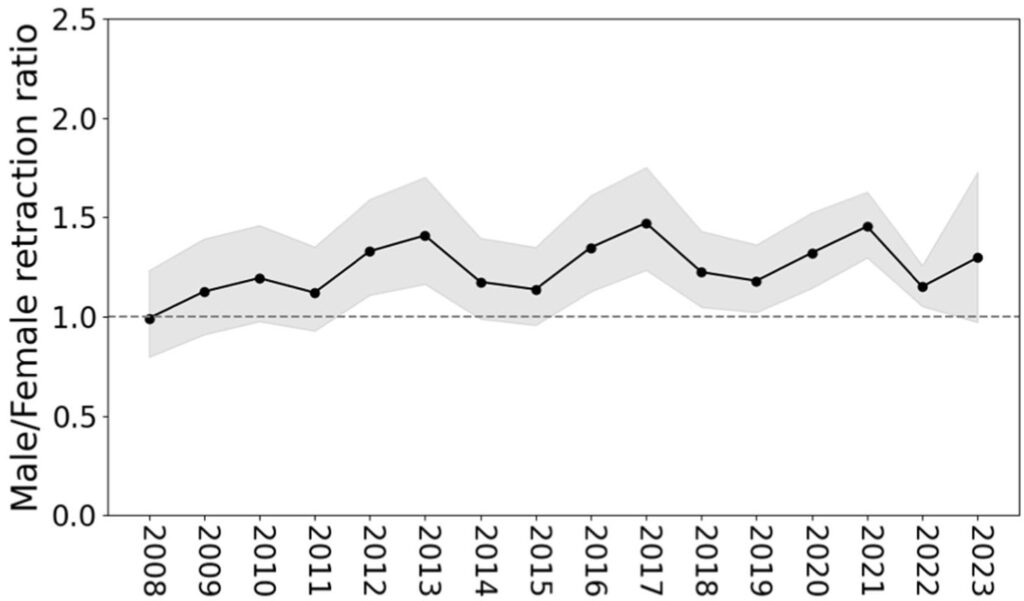
When you look at retracted papers, you find more men than women among the authors. But more papers are authored by men than women overall. A recent study comparing retraction rates, not just absolute numbers, among first and corresponding authors confirms that men retract disproportionally more papers than women.
The paper, published May 20 in the Journal of Informetrics, is the first large-scale study using the ratio of men’s and women’s retraction rates, said study coauthor Er-Te Zheng, a data scientist at The University of Sheffield. The researchers also analyzed gender differences in retractions across scientific disciplines and countries.
Zheng and his colleagues examined papers from a database of over 25 million articles published from 2008 to 2023, about 22,000 of which were retracted. They collected the reasons for retraction from the Retraction Watch Database, and used several software tools to infer each author’s gender based on name and affiliated country.
“The biggest limitation is gender inference,” Zheng said. The researchers couldn’t determine gender of the first authors of 47.1% of the retracted papers and 23.3% of the non-retracted papers. The software tools the authors used draw on historical Western-based name databases, which do not account for nonbinary authors or those from non-Western countries.
Whether looking at first authors or corresponding authors, men had an overall higher overall rate of retraction than did women, but the researchers found no difference when looking at papers retracted due to mistakes. However, men had higher rates of retraction for misconduct, especially plagiarism and authorship issues.
“The difficulty from all these studies, when we say that men are committing more misconduct than women, is what do we have to do?” said Evelyne Decullier, a methodologist at Hospices Civils de Lyon in France who examined gender differences in retractions within health sciences in a study published in 2021. “We need to understand what is behind that.”
Among the 10 countries with the most retracted articles, among first authors, men had a higher retraction rate than women in Iran, Pakistan, and the United States. Women had higher retraction rates in China and Italy, though the researchers noted that the data from China needs further validation, as over 80% of the authors with unidentified gender were affiliated with Chinese institutions.
Men had higher retraction rates in biomedical and health sciences, and life and earth sciences. These results align with prior studies, said Ana Catarina Pinho-Gomes, a public health consultant at University College London who conducted a similar 2023 study focusing on retractions within biomedical sciences. In contrast, Zheng and his colleagues found that women retracted papers at a higher rate in mathematics and computer science.
While the study was descriptive and cannot address the reason for this result, the authors have a hypothesis. “There may be some cultural and expectational differences in this field that women are historically underrepresented in,” Zheng said. “This may create some pressure or expectation for female researchers.”
In addition to pressures at the author level, “perhaps there is a bias in the evaluation process that leads to female authors having their work scrutinized more closely,” said Mariana Ribeiro, a postdoctoral researcher at Brazil’s National Cancer Institute who has examined gender differences in self retractions. (She is also a Sleuth in Residence at the Center for Scientific Integrity, the parent nonprofit of Retraction Watch). Alternatively, “we cannot disregard the possibility that women may be more reluctant to self-correct or to accept corrections to their work, fearing negative repercussions that could also be amplified by existing gender biases.”
Like Retraction Watch? You can make a tax-deductible contribution to support our work, follow us on X or Bluesky, like us on Facebook, follow us on LinkedIn, add us to your RSS reader, or subscribe to our daily digest. If you find a retraction that’s not in our database, you can let us know here. For comments or feedback, email us at [email protected].
I’d add that women may feel the need to due their due diligence to a higher degree than men